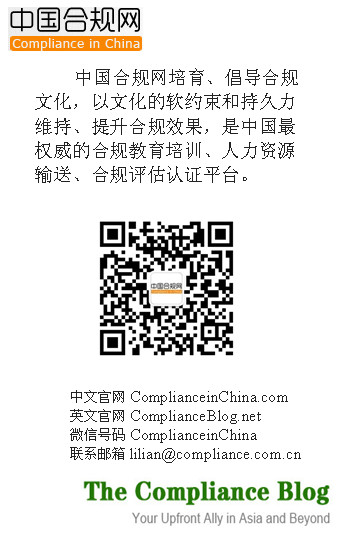If a local manager in China pays bribes and is liable under the law, could his or her supervising executives in the U.S. or Europe also be held criminally responsible? Or should they shrug off the possible liabilities by claiming “the mountain is high, the emperor is far away?”
China law imposes responsibility for crimes committed by business “units” (such as bribery) on a couple of categories of individuals -- “the responsible persons who are directly in charge” (直接负责的主管人员) and “the other persons who are directly responsible” (其他直接责任人员).
Although the law isn't entirely clear about who might be included in these broad categories, we can learn a lot from how it's been applied.
Here are two illustrative cases:
In 2007, a Shanghai company, Nong Kai Development (Group) Co., Ltd., was found guilty of offering commercial bribes $66,000 to government officials at a commodities exchange and a bank. The board chairman of Nong Kai Group, Zhou Zhengyi, was convicted for bribery because he decided on the illegal payments and personally delivered them to the officials. As a result, Zhou was convicted and punished as the “the head directly in charge.”
In another case, a company from Helongjiang province was convicted in 2003 for offering a bribe to State workers. The chairman of the board was convicted as “the responsible person who is directly in charge” – he withdrew the cash from the company and offered it to the bribe recipients. In the same case, three other individuals were convicted of offering commercial bribes. They were departmental managers and/or salespersons from the company and actively participated by offering bribes directly to the State workers. Therefore, they were found to be in the category of “the other persons who are directly responsible.”
It seems clear, then, that persons who decide to commit a crime (such as bribery of government officials) or who execute the criminal acts (such as handing over bribe money) can be liable for corporate crimes.
In real life, there are always arguments about who made the actual corporate decision or took the action to execute it. But in my experience, the most frequently-asked question in determining decision-maker liability is not whether a person actually knew about the criminal activity (which is almost always denied) -- but whether he or she should have known.
* The article was originally published at http://www.fcpablog.com/blog/2013/8/20/who-is-liable-for-business-crimes-committed-in-china.html
** Licensed in the PRC and the New York State of the U.S., Henry Chen, the author, is a Shanghai-based partner at MWE China Law Offices in stratetic alliance with McDermott Will and Emery.
Henry has extensive experience representing enterprises in administrative and criminal investigations of alleged commercial bribery cases; providing counsel for the investigation of employee misconducts; helping clients conduct pre-merger due diligence investigations and post-merger integrations; providing training and seminars in Chinese and English to the employees of MNCs regarding anti-corruption and bribery pitfalls; providing FCPA investigations and auditing for the presence of American companies in China and for companies listed in the U.S.; helping companies update and strengthen their internal anti-corruption compliance programs and controls and tailoring them to the unique features of Asian markets.
Henry’s research about FCPA enforcement and Chinese anti-bribery and -corruption law has been published or quoted in leading publications, including the Bloomberg Asia Pacific Law Report, Wall Street Journal, China Law & Practice and ALB. Henry is also the host of Linkedin groups: "Compliance in China” and “Anti-Corruption Compliance Asia.”
Henry is available at henrychen@mwechinalaw.com






